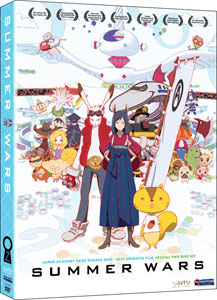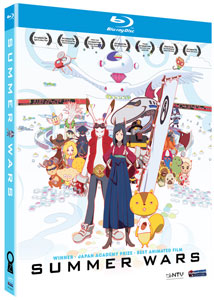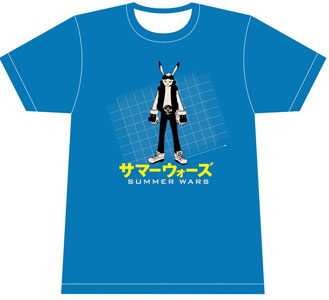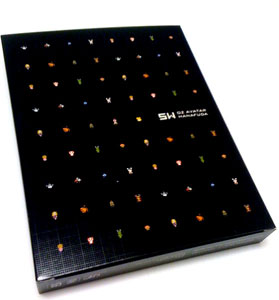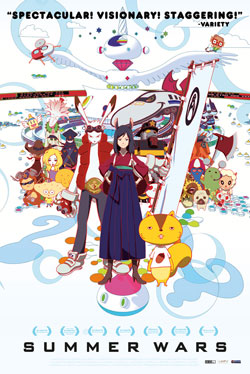Hot off its limited theatrical run (and hopefully an upcoming Oscar nomination) FUNimation has slated Momoru Hosoda's Summer Wars to be released on DVD and Blu-ray on February 15th.
Kenji is your typical teenage misfit. He’s good at math, bad with girls, and spends most of his time hanging out in the all-powerful, online community known as OZ. His second life is the only life he has – until the girl of his dreams, Natsuki, hijacks him for a starring role as a fake fiancée at her family reunion. Things only get stranger from there. A late-night email containing a cryptic mathematic riddle leads to the unleashing of a rogue AI intent on using the virtual word of OZ to destroy the real world, literarily. As Armageddon looms on the horizon, Kenji and his new “family” set aside their differences and band together to save the worlds they inhabit in this “near-perfect blend of social satire and science fiction.” (AnimeNewsNetwork.com)
To mark the upcoming release of what's bound to be an anime classic, AICN Anime is excited to have two Summer Wars price packs to give away.
A "Win it Before You Can Buy It" Grand Prize Winner will receive
Summer Wars 11 X 17 premium double sided poster
Summer Wars full size 1-sheet movie poster signed by Japan Academy Prize winning director, Momoru Hosoda
Summer Wars official limited edition Hanafuda cards
Summer Wars King Kazma XL T-Shirt
Summer Wars on winner’s choice of DVD or Blu-ray
A runner up will receive
Summer Wars 11 X 17 premium double sided poster
Summer Wars official limited edition Hanafuda cards
Summer Wars King Kazma XL
To win one of a Summer Wars prize pack, send an e-mail, along with your postal address, the subject line "Summer Wars," and your DVD/Blu-ray preference to animecontest@gmail.com by Midnight, February 6, 2011.
Sorry, but the contest open to US Residents only, no PO Boxes accepted.
To follow other FUNimation happenings, be sure to check out their newsletter.
Anime Spotlight: Summer Wars
When the movie hit the global stage, some apparently came away from Akira with the false assumption that there was a sea of anime movies out there that, if not equaled its achievements, at least explored similar subjects to Akira and at least attempted to grasp its level of artistry. And, Streamline found the Robot Carnival anthology, and the Neo Tokyo anthology... and the Lensman anime, Vampire Hunter D, Doomed Megalopolis... and not-so-classics like Planet Busters and remarkable, but forgotten Twilight of the Cockroaches. Some of these hit Japan as direct to video OVA's so, I'm kindof fudging classifications here, but that's part of the point.
I wouldn't be surprised if there were anime gurus out there who could name every anime movie made by a major producer. There aren't that many anime features like the works of Katushiro Otomo, Hayao Miyazaki Isao Takahata, Mamoru Oshii or Satoshi Kon. There aren't many secret gems that you wouldn't have heard of if you spend much time reading about anime. But, factor in the cloud of lesser anime movies... There are some bad ones out there, and sometime it seems like most of the ones not by the acclaimed masters have serious problems, especially in the scripting, especially the way that they erect rickety plot bridges to connect set piece islands. And factoring that in, apart from popular franchises that turn out movies on an annual basis (One Piece, Naruto, Bleach, Pretty Cure, Crayon Shinchan, Doraemon), there still has never been that many anime movies produced. OVAs came and largely went. TV production boomed and settled, remaining the chief focus of anime production. But, the economics of making anime movies have always been a risky venture.
So, an anime movie is special.
Summer Wars was produced by Madhouse, the studio behind a disproportionate count of anime that has received international recognition, like Ninja Scroll and other Yoshiaki Kawajiri works including Vampire Hunter D: Bloodlust and Wicket City. Most of the anime adaptations of the works of manga mega-team CLAMP have come out of Madhouse (Card Captor Sakura, Chobits, X). Many of the notable anime anthologies built about American IP have featured work from the studio (Animatrix's Program and World Record, Batman: Gotham Knight's In Darkness Dwell and Deadshot). They're the studio doing the anime adaptations of Marvel's superheroes. And, in addition to trying to keep a grip on the commercial side of anime production, Madhouse is a studio that takes the art of anime seriously, producing the Satoshi Kon movies, by all reports stunning Redline and highly regarded, but unlicensed Dennou Coil.
So, a movie from Madhouse is special.
There are those who'll argue that Digimon anime is better than you'd expect an tie in to a Pokemon challenger to be, but, beyond that, there's a consensus that Mamoru Hosoda's work on the first two Digimon movies elevates the material. His not-licensed-for-America One Piece Movie 6: Baron Omatsuri and the Secret Island is supposed to be excellent too. After Toei, he spent time at the revered Studio Ghibli, and he was to have been a significant part of Spirited Away, but things did not work out well. Translated from a French interview:
Ghibli is essentially a studio made to produce Miyazaki’s works, and unfortunately, not something else. Ghibli’s success put the animation production into a not healthy state, because today, in Japan, we think only Ghibli’s animated films deserve to be seen. When basically, there’s place for films from studio 4°C, Mad House studio or Toei, knowing new talents won’t come from Ghibli. From
He then laid down his calling card with his beautifully animated, moving adaptation of The Girl Who Leapt Through Time..a magnetic, touchingly personalized take on a Yasutaka Tsutsui novel that had already turned received popular adaptations. And with that, to the globe, Hosoda became one of "Next Miyazakis."
So, a Madhouse movie from Mamoru Hosoda is special.
I think a lot of anime fans are going to second and third guess whether to call Summer Wars a great movie... between the suggestion that hope for another great movie from Hosoda might cloud perceptions, a message with some ambiguity, and dazzling elements, it's an involving marvel, but, how well does that thought and artistry behind the experience hold up?
Personally, I think that there are reasons to debate Summer Wars. I think that there are plenty of aspects to take issue with, criticize it for or be uncomfortable with. And, I think the fact that it can excite a complex reaction is to its credit.
As a complete package, Summer Wars is unique, and compelling for a number of reasons, including that uniqueness. Visually, it's breathtaking, and breathtaking in a way that contributes to the movie's storytelling. Admittedly, here, I'm grading Summer Wars on an anime movie scale, but, as a meaningful, coherent narrative, Summer Wars' flawed script is still remarkably substantial.
Kenji Koiso almost made it into the Math Olympics, but instead found himself with the comparatively humbler prospects of spending the summer doing coding/security work for online super hub OZ (we see some tag language documents and scripts over his shoulder - given his better-than-nothing demeanor, presumably, his station in keeping Oz operating isn't terribly impressive).
Natsuki Shinohara pops in to offer Kenji some alternative summer break employment, which he declines... until he learns that the work entails traveling with this schoolboy crush to her ancestral home. This is not impressive work either. Kenji is basically just going to be a warm body. Natsuki's uber-family, the Jinnouchi clan, is gathering to celebrate matriarch Sakae Jinnouchi's 90th birthday. Turns out, when her great grandmother was suffering a bout of bad health, Natsuki hoped to cheer Sakae Jinnouchi by telling her that she had a fiancé from a prestigious family, attending a prestigious university. Kenji, chosen because he was available and willing, is to act the part of the finance during the celebrations.
After a dizzying afternoon on the estate, meeting a platoon of Jinnouchi from seemingly every station of productive society from a police patrol to a fishing captain, to a Japanese Self Defense Force officer, Kenji is preparing to get some rest when his phone prompts him with a message containing a string of numbers. Kenji takes out his scratch paper and begins spending the night decrypting... responding to the message's sender with the results. When everything is said and done, Kenji apparently cracked Oz's security encryption. Consequently a rogue, Hindu divinity looking avatar known as Love Machine begins corrupting OZ, and since so much of government and business is run out of virtual space, by extension, havoc spreads into the real world. It falls upon Kenji, Natsuki and the sprawling collection of Jinnouchi to restore OZ and global order.
One of anime's strengths is its ability to blur the lines between the fantastic or unreal and the real. In the movies by Hosoda's Madhouse compatriot Satoshi Kon, mental and physical landscapes were overlaid. Worlds from his characters' imaginations, dreams, psychoses or even media appearances and those characters' concrete realities could be indistinguishable.
That's not the case with Summer Wars.
There's a physical world, mostly populated by Jinnouchi and mostly set in the green fields and traditional halls of their estates. And, whether it's the natural surroundings or the throngs of humanity, it's beautifully, precisely animated.
You could maybe say that there's actually three worlds on display in Summer Wars. Human, physical place and virtual. There's an abstraction to Yoshiyuki Sadamoto's (Girl Who Leapt Through Time, Neon Genesis Evangelion) character design that is not found in the static details of the scenery. But, those two elements are of a piece. There's a realism in the thought out specificity of the backgrounds. The way that one room is fully furnished, and another room can be seen on the other side of a courtyard through a window, or how the town is laid out in the valley below, or how a towering nimbus cloud gently drifts in the sky ( a through line to The Girl Who Leapt Through Time), it's evident that this place was thoroughly considered by its animators.
For the people, the animation is less a function of planning architecture, object layout and landscaping and more persuading. As such, Summer Wars exemplifies what great 2D animation can do. It conveys mood and character through nuance and mannerisms, and it does so on mass. When a few people are on screen, the way the subject in focus might nod as they talk convincingly suggests the reality of that person. But, Summer Wars has plenty of scenes of rooms full of Jinnouchi. Just seeing Hosoda orchestrate the 10's of arms on screen is astonishing. Someone will be drinking and talking slightly inebriated while an infant is fed in the background, and the net is that stories and personalities are conveyed for a legion of characters who don't really get many lines of dialog.
The other world in Summer Wars is Oz. That featured its own design team, including Masaru Hamada, Mina Okazaki and Yoshio Okazaki. Takashi Murakami and the superflat movement are clear inspirations to the distinct toned iconic characters moving across white fields. This is an eye catching treat. Whether it's the creative marvel of congregations of cute icons or exciting bits of exaggerated violence, the appeal of the online is effectively conveyed. It's not beautiful the way the Jinnouchi estate is, but the captivating draw of the virtual is still in evidence.
Never in Summer Wars are you going to confuse avatars like Natsuki's kitsune fox woman, Kenji's yellow squirrel in an acorn t-shirt or the jack rabbit street fighting champ King Kazma for their human counterparts. The two world are distinguishable at a glance. So, there's no Kon-scious blurring of the real and digital worlds. But, the boundary is still smudged. Hosoda gets to have his cake and eat it too. Maybe Inception is now putting lie to the line of thinking, but, still, where but animation can you jump between two such visually distinctive reality without hitting a jarring transition?
That the worlds are distinguishable at a glance is an element of a dialogue in which distinctions are unignorable. For one thing, the name of the movie is actually "Summer Wars." That it is the English words is indicative.
That said, the relationship between these distinguished domains is not cut and dry. New worlds: global and virtual, aren't simply competing with the old ones: real, traditional; they're complementing each other.
Relationships and values are not defined by a medium of communication. So, there are heartwarming shots of a phalanx of Jinnouchi holding up their cell phones and portable gaming devices.
However, just because no side is simplistically condemned, does not mean that all things are equal.
The view of the new/virtual is cautionary, where as the view of the traditional/real is positive. In particular, traditionalism is boosted.
The audience eats up when the family matriarch grabs a naginata spear off the wall and charges the moment's villain.
There are digital scenes that do elicit cheers. A heroic champion avatar leaps into battle or takes the upper hand in a critical game, but these digital high spots have more traditional footing than tapping keyboards... the former being link to trained martial arts, the latter to the card game Hanafuda (possibly intentional irony: in the late 19th century, Nintendo was founded as a hanafuda card maker)... even Kenji does his math on scratch paper.
The strength of Hosoda's storytelling is such that you don't have to be familiar with Japanese culture to connect to what he's saying. You don't need to recognize that it's a kendo stick strapped to her back during Natsuki's introduction or follow her references to the Showa calendar to feel the swell as family and tradition step up to assert itself... Nothing persuades like an eye-filling spectacle.
I'd like to think that my reaction is largely rational, and not just knee jerk because I'm American, and to some extent, America is depicted by Summer Wars as pissing into the pool of the global community.
The line between what's an American hang-up and what's really questionable is complex. I don't think it should be held against Summer Wars that Americans are generally uncomfortable with its sort of tradition. But , I do think that there is room for skepticism of its view of the subject and I do think that some of the tradition on display here is inarguably outdated.
The Jinnouchi have a very evident history as landed gentry from the samurai class. They were retainers of the Sanada, lords of what is now Nagano Prefecture who prominently feature in martial period stories, from the pre-unification Warring States/Sengoku Period and the later Edo Period.
The family boasts about their campaigns. In a moment of physical crisis, they rush to protect the samurai heirlooms. Sakae Jinnouchi reaches out on the phone and appeals to a peer with the reminder that both their families were Sanada retainers.
Summer Wars might be ambivalent about online connections, but it displays no such conflicted thoughts about those forged in a 17th century war.
Now, there isn't much of an American equivalent, but imagine wrapping an appeal in "we came over on the Mayflower together" or "were officers in Civil War together." Or, more appropriately, imagine the reaction if characters in a movie did that.
I might be betraying a grossly American perspective from someone whose family name got lost in the shuffle at Ellis Island, but I don't think it's entirely wrongheaded to not love how Hosoda aims, and begrudgingly succeeds, in eliciting a swelling heart at these evocations of a family's warrior class history. In effect, the Jinnouchi do lead by example, action and personal merit, but, remember, Summer Wars literally staked its position with its samurai connection. The first promo art images for the movie had Natsuki holding the family's battle banner. The emphasis is unignorable.
Beyond succeeding in prompting its desired emotional reactions, ultimately, I give Summer Wars credit for being not easily dismissed. It's difficult to write off its argument for valuing traditionalism.
As a movie about social networks, both the type maintained on Facebook and the type maintained with phone calls, handwritten letters and reunion gatherings, Summer Wars couldn't be more timely, and, it deserves to be warmly greeted. And, the favor is returned. For all the class implications of the Jinnouchi, Summer Wars invites the audience to feel included in their grand adventure.
Overwhelmingly colorful and rousing, boasting a big, raucous energetic and at the same time credible group, Summer Wars achieves summer blockbuster scope and appeal. It's the kind of anime to be recommended universally to any, regardless of their level of interest in medium. You can pick apart its plot. I think its point of view can be engaged and argued. And still, it’s a rare gem. See if because, really, there aren't that many anime movies made. And, see it because, beyond the scarcity of its like, it's a wonderful work.

